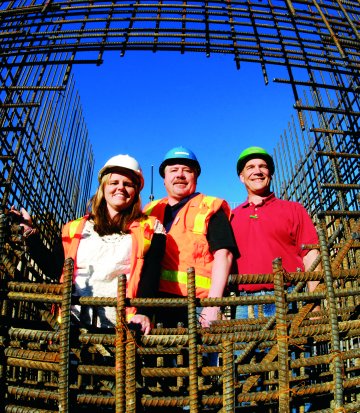 When Todd Woodley and Greg Huston took over Slayden Construction in 2002, they inherited a solid family business with a strong record of placing power in the hands of employees.
When Todd Woodley and Greg Huston took over Slayden Construction in 2002, they inherited a solid family business with a strong record of placing power in the hands of employees.
MARCH 2009: THE 100 BEST
BUILDING THE BEST
BY BEN JACKLET
When Todd Woodley and Greg Huston took over Slayden Construction in 2002, they inherited a solid family business with a strong record of placing power in the hands of employees.
| THE NO. 1 MEDIUM COMPANY |
| SLAYDEN CONSTRUCTION GROUP |
“Whatever you felt you could do, the company supported you,” says Woodley, who worked as an engineer and project manager for Slayden for 11 years before becoming president. “If you wanted to take on a $10 million job and you had never done anything like that before, the attitude was always, ‘go for it.’”
Woodley and Huston have embraced that attitude and built on it. The results have been steady growth and an ever-improving workplace package: 100% paid health and dental benefits, winter team-building trips to Maui, Baja and Disneyland, a scholarship program for children of employees and coverage of child care expenses.
Between the generosity of the company’s benefits and its rare ability to offer job security in these times, it’s not surprising that Slayden did so well in its first year of participating in the 100 Best survey. The company employs 52 people permanently and ramps up to 200-plus field personnel depending on the size of the contracts it lands.
 President Todd Woodley (center), surveys a Clackamas County public works project with HR manager Jennifer Erickson (left) and project superintendent Ed Pietrok. PHOTOS BY ANTHONY PIDGEON |
To explain Slayden’s successful debut, Woodley defers to employees, and their enthusiasm tells the story emphatically. “You look at my Facebook page and it says I work for the best company in the world,” says office manager Heidi Minten. “That’s really how I feel.”
Comments from other employees in the 100 Best survey echo that positive theme. Under the category of “what makes the company great,” the list of comments is long: trips to Hawaii and Legoland, a “high level of respect” and “a knack for taking care of employees both financially and emotionally.” Under the category of “what to improve,” suggestions are sparse, with one respondent writing simply “Nothing!”
The word family comes up often when you make the rounds at Slayden’s laid-back headquarters in Stayton (population 7,765). Not just the family-friendly trips and benefits, but the flexibility that enables workers to put family first without slacking off on the job.
“I’m a single parent, and if I need to go pick up my kids at 3, I go do it. No questions asked,” says treasurer James Gustin, a 12-year Slayden veteran. “Everyone wants to earn a good income, and we do. But having the flexibility to spend extra time with your family, that’s worth a lot, too.”
Woodley developed his belief in flextime during his years coaching his son’s baseball team. In his view flexibility is a mandatory element of remaining competitive. “If one of the employees needs to take off for a couple of hours to take their kids to an eye appointment or something, they know they can do that,” he says. “They don’t need to fill out a form three weeks in advance or anything like that. The focus is on the end product the employee provides, not clocking in and clocking out.”
 |  |
| Slayden’s workplace package combines generous office perks and a solid in-the-field safety record. | |
Perhaps the most concrete example of Slayden’s company commitment to family is the new dependent-care benefit. Slayden offered up to $5,000 per employee starting in 2008 and paid out $110,000 directly to child-care centers in the program’s first year. “It was like getting a bonus,” says contract administrator Angie Porter, who has been with the company four years and has two children, 6-year-old Maile and 3-year-old Carson. Her monthly day-care costs dropped from $510 to $95 per month. “It makes us feel like they care about our families,” Porter says of the owners.
That ethic isn’t restricted to the office alone. Minten, who has been with the company for three and a half years and in the accounting field for 22 years, says, “I’ve never seen a company do the kind of community giving this one does. Their generosity amazes me.”
   Slayden employees Kim Shelby and Jamie Hensley (top), Samantha Barbour and Heidi Minten (middle) and Traci Clarke and Kim Shelby (bottom) enjoy benefits ranging from company-paid child care to free trips to Mexico and Hawaii. |
When a classmate of Minten’s son named Collin Callsen became ill with a rare form of cancer, Slayden spent $20,000 on a dinner and auction that raised $150,000 for the family. That effort ultimately resulted in the recent creation of the nonprofit Slayden Community Fund.
And then there is the fun stuff. “There are so many things to look forward to here,” says property manager April von Backstrom. “How many companies in the world take all their employees to Cabo or Disneyland?”
Slayden has covered airfare and lodging for company trips each winter since 1995. This year’s jaunt to Cabo San Lucas in February covered airfare and four nights of lodging for 45 employees and their guests, at an estimated cost of $150,000.
Slayden also keeps up morale with a suite at the Rose Garden available to the employee of the month and others on a first-come, first-served basis. Employees also get free tickets to big Ducks and Beavers games and other sporting events. When Oregon State made the finals of the College World Series, project manager Alison Helms begged Woodley to arrange a trip to Nebraska, and he went for it, sending 21 people to the big game. Helms, a 32-year-old OSU graduate, cites that trip as an example of why she loves her job. She also cites another, bigger factor: the unusual opportunity, in a male-dominated field, to make project manager in six years, overseeing a $93 million project.
To keep the perks flowing in hard times a company must be fortuitously situated. Under Woodley, Slayden has expanded from schools and buildings into engineered public works such as wastewater treatment plants. Slayden has completed over 30 treatment plants, about as recession-proof a service as a business can provide.
With the private sector slowing and home building virtually on hold for the near future, Slayden is fortunate to specialize in high-wage public projects. 2008 was the best year ever for the firm: $135 million in revenues as compared to $116 million in 2007. That’s a 16% increase during a year when Oregon lost 12,900 construction jobs.
True, competition for public projects is picking up as contractors flee the private sector to find jobs. But Slayden’s position likely will remain strong because of its record of meeting budgets consistently and safely (its experience modification rating, which measures workers’ comp expenses over three years, is about half of the industry average.) Around 80% of the projects Slayden bids on are negotiated with the client, rather than simply granted to the lowest bidder.
Woodley says he is cautiously optimistic about Slayden’s chances of winning new key contracts in 2009. One thing he does guarantee outright is that he will not follow the trend toward saving money by limiting benefits. Part of his reasoning is pragmatic: “To get to the top of your industry you have to attract and retain the best people you can.”
The rest is based on his personal philosophy: “It’s just responsible employment.”
Have an opinion? E-mail [email protected]

